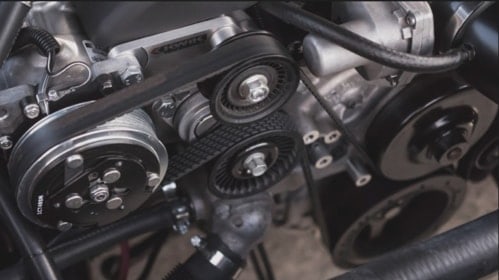When your car won’t accelerate, that is a serious problem. There are a few different scenarios that can cause this. Before looking into anything else, if your check engine light is on, get a code scanner and see what trouble codes are stored in the computer system. They can provide valuable insight as to what the problem may be, and really help you narrow down the problem.
Car Won’t Accelerate But RPMs Go Up
If your car won’t accelerate, but the RPM’s go up it’s usually not going to be an engine related issue. Somehow, the power that your engine is creating is not making it to the rear wheels. This is typically a transmission related issue.
Here are the most common cause of acceleration with the RPM’s going up:
1. Low Transmission Fluid
If your car gets too low on transmission fluid, it’ll will no longer be able to accelerate. The transmission fluid is responsible for moving the power to the wheels. When there isn’t enough of it, the power goes to the torque converter, and that’s the end of the line.
Check the transmission fluid immediately.
2. Bad torque converter
The torque converter is responsible for taking the mechanical power of the engine and converting it into hydraulic power. If the torque converter has gone bad, it will no longer be able to do this job. No power can get to the transmission.
3. Drivetrain No Longer Connected to Wheels
If you’ve broken a drive/axle shaft, your transmission has no way to turn the wheels anymore. If this were the case, there would not be any movement whatsoever from your car. You also wouldn’t feel the slight jerk of the car as you put it into gear.
4. Clutch
Although the manual transmission is going away, if you happen to have a car or truck equipped with one, a bad clutch can cause it not to accelerate. The clutch is responsible for making a direct connection between the engine (via the flywheel) and the transmission (via the input shaft).
When the clutch can’t hold on anymore, it’ll start to slip. Slipping means that it loses its grip on the flywheel and it feels like you’ve pushed the clutch in. This will usually happen at highway speed, under heavy acceleration. It only gets worse as the clutch disk slips, burns up, and can handle less and less torque.
Car Won’t Accelerate (RPM Stays Put)
If the car won’t accelerate, but the RPM’s do not change, that is an indication that there is an issue with creating power. The issue is going to be something affecting the motor.
Here are some common issues that can affect the motor:
1. Clogged Catalytic Converter
If the catalytic converter gets too clogged up, it’ll keep the motor from accelerating properly. It’ll “bog” after a certain speed. Maybe it’ll drive 20 miles an hour just fine, but after that it just doesn’t want to accelerate whatsoever. This can also be a sign that it’s not getting enough fuel as well.
2. Bad Fuel Filter
A bad fuel filter will not let enough fuel into the vehicles injectors to support operation above a certain demand on the engine. It just can’t provide the fuel pressure. If this is the case, like the catalytic converter, it’ll feel like everything is fine until you hit a certain speed, and then it’s going to bog down again.
3. Timing Chain or Belt
The timing chain (or belt) is responsible for keeping the upper valve train synced with the crankshaft. This is vital for spark timing. If the timing is off a little and the engine still runs, the timing belt may have skipped. If it has jumped too much the vehicle may not even fire.
4. Vacuum Leak
Your engine creates vacuum as it runs. The amount that is created is carefully thought out during the engine design process. When there is too much vacuum, it creates a situation where air is not coming in and being read by the MAF sensor, which causes the car to run wrong and not accelerate.
Conclusion: Car Not Accelerating
As you can see, there are a lot of reasons that a car may not accelerate. Good luck diagnosing yours. If there is anything that you can add, please feel free to leave a comment.

